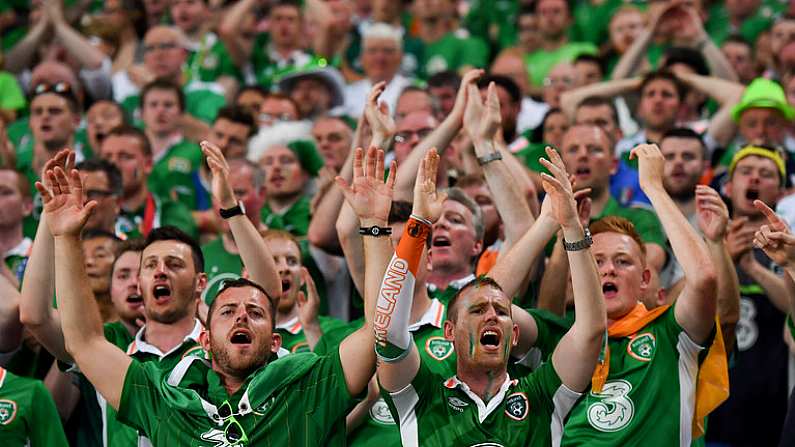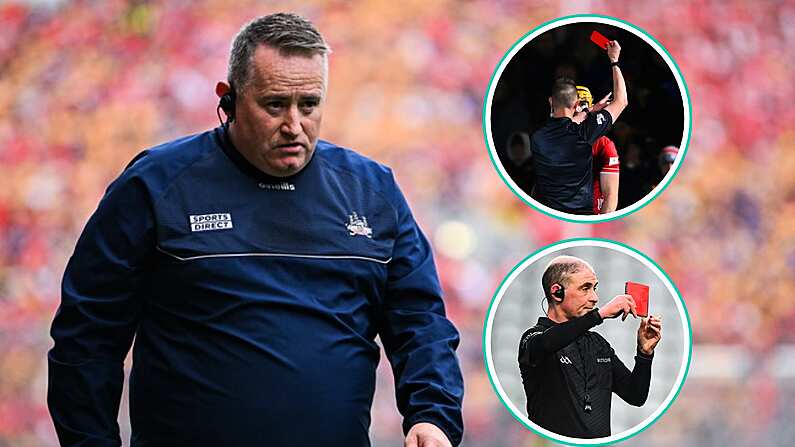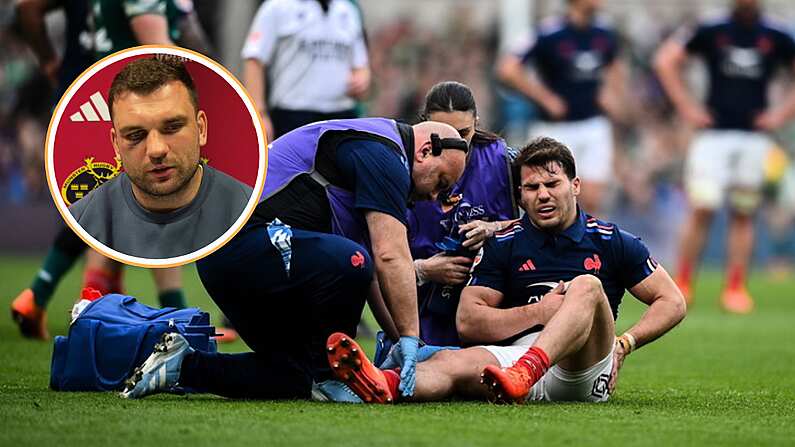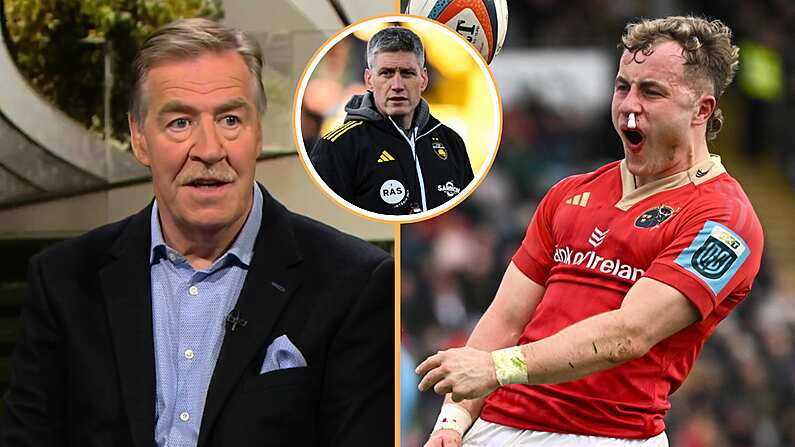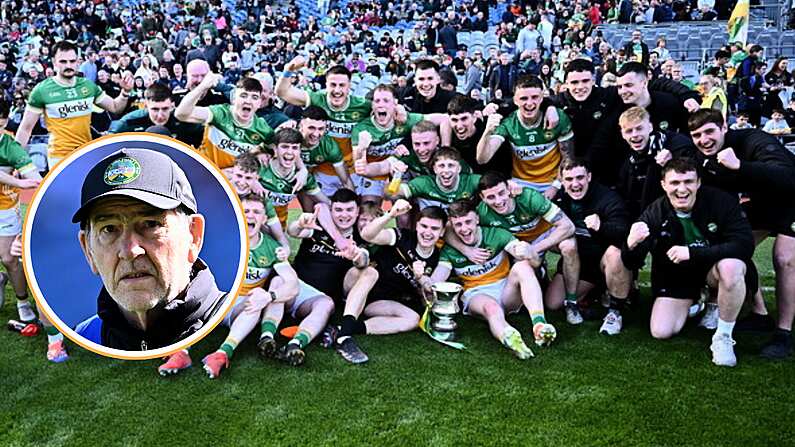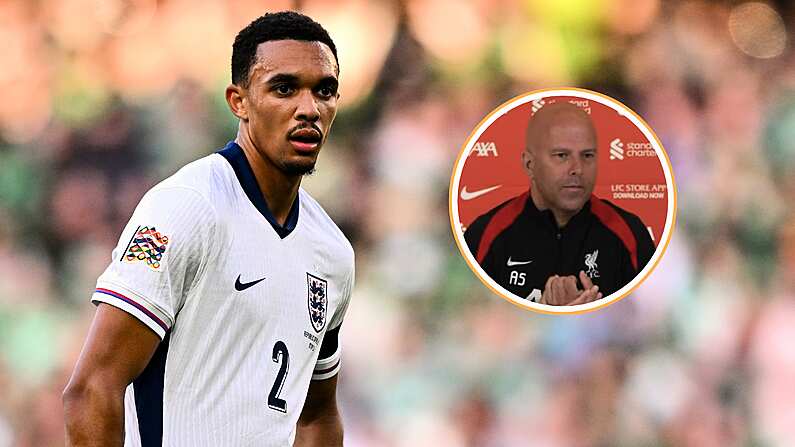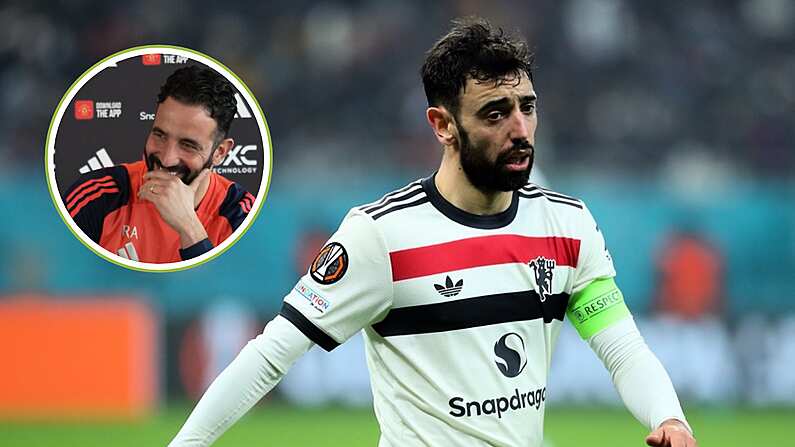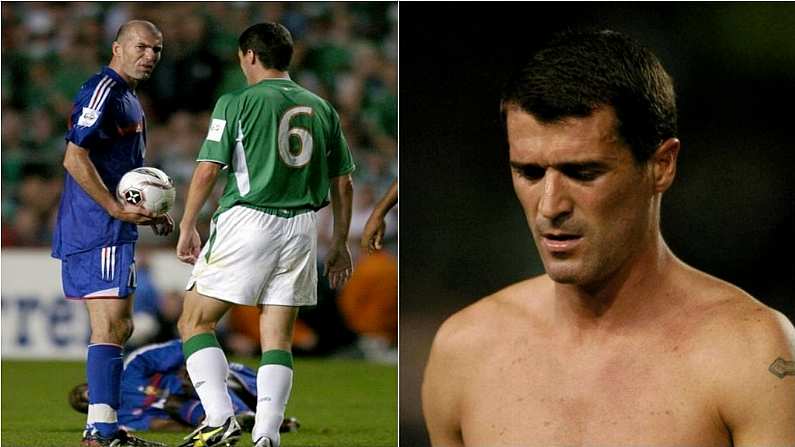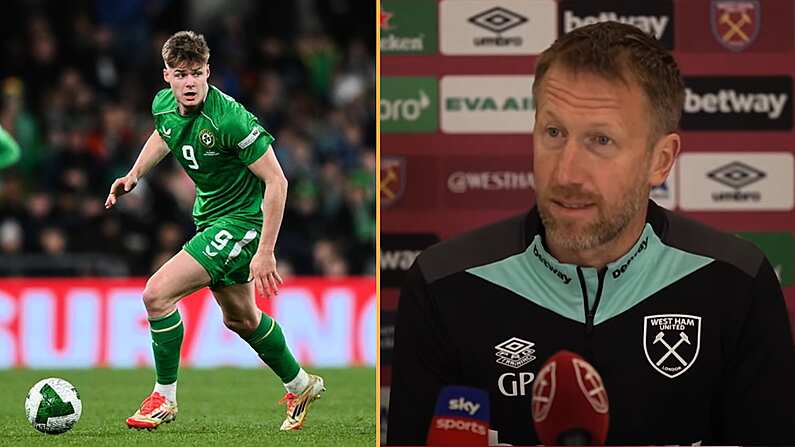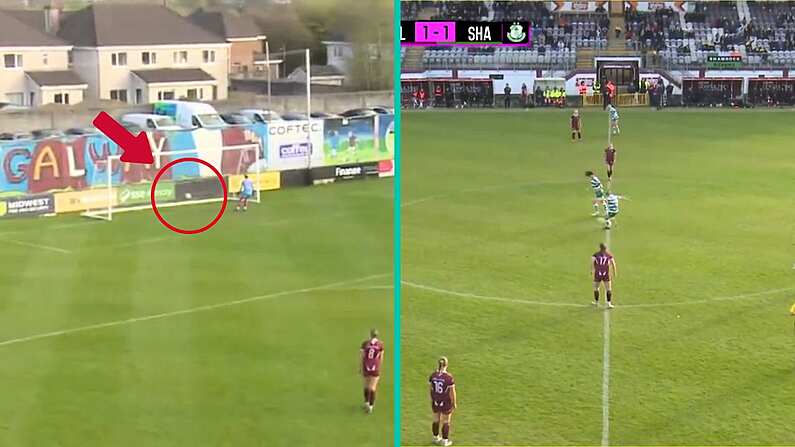There are few instances when a French fan boisterously joining a drunken horde of Irish people in a rendition of 'Dirty Old Town' could be considered basically normal, but that was the case in Euro 2016.
On that occasion in Bordeaux, the fact that this French bystander appeared to know all of the words to the famous ballad popularised by Irish groups went virtually unnoticed due to the sheer mayhem among the Irish cohort.
Mayhem just about sums up the Irish experience in France four years ago and, since today marks the four-year anniversary of Ireland’s win over Italy in Lille, the time is ripe to look back on the highs and the lows of Ireland’s French odyssey.
Our journey started in Dusseldorf and, like many Irish fans, we had become self-taught experts on different train routes into Paris due to extortionate flights to the French capital and an ever-present fear of French air traffic control strikes.
Nothing could have prepared us for Paris when we did finally arrive.
The experience of being in Poland four years previous was nothing – absolutely nothing – compared to the experience on the Boulevard de Clichy where the Irish fans congregated on mass. Whether the fact that famous burlesque house the Moulin Rouge was just a stone’s throw away from the epicentre of the Irish supporters was by design or not is a debate that still rages to this day.
On the eve of Ireland’s tournament debut against Sweden, scenes on the boulevard reached a fever pitch.
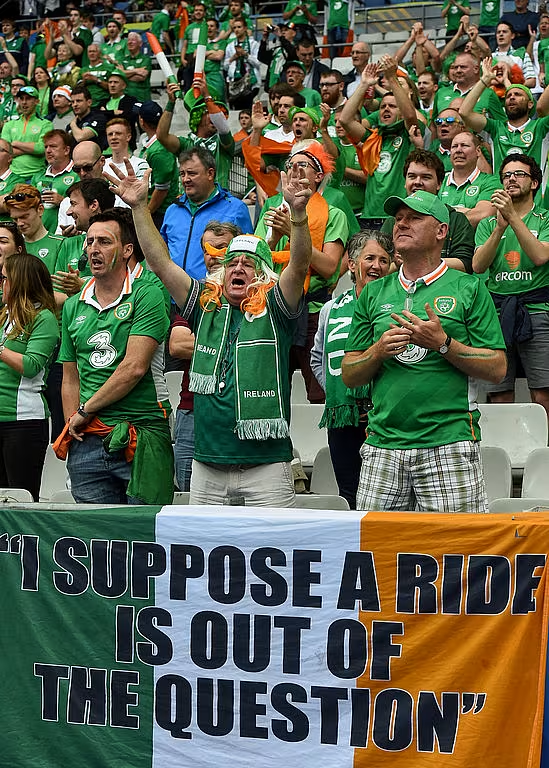
By nightfall, the scene had descended into disorganised chaos with broken glass on the streets and damaged car roofs aplenty.
We retreated from the chaos to a quiet Algerian bar far removed from the chaos in a bid to find some semblance of normality some time passed midnight. How wrong we were.
The Algerian bar owner, as it happened, turned out to be an avid fan of Irish culture and, within moments of our arrival, Riverdance blared from the bar’s sound system.
Some of the merrier members of our party decided that it was an apt time to release their inner Michael Flatley and their rowdiness attracted several more Irish fans so that, in just a few short moments, we might as well have been outside the Moulin Rouge once again.
Monday morning dawned in a similar vain and the banter between Irish fans and their Swedish counterparts reached a crescendo as kick-off approached.
As scenes of English fans clashing with Russians in Marseille dominated the news, Irish and Swedish fans’ behaviour was exemplary and so there was no fear when both sets of fans crowded into a metro station together en route to the Stade Denis.
Crammed into the station like sardines, some Irish fans began cheerfully chanting “Go home to your sexy wives” and the Swedes answered with the more uninspired “Zlatan Ibrahimovic” set to the same tune.
This continued for some time until one witty Irish fan filled a temporary silence by belting out ABBA’s 'Thank You for the Music', that famously renowned football chant. Within minutes, everyone inside the station was singing the Europop song in unison in one of the more bizarre moments of the entire trip.
With all this going on, you would almost forget there was a game to be played but, as soon as we stepped into the Stade Denis, we were under no illusion.
The French national stadium was a sea of colourful green and yellow and the atmosphere resembled that of a carnival throughout the 90 minutes.
But by the time kick-off came around, all good-natured banter was forgotten and it was impossible to wish anything but ill will on the Swedish team, such is the tribalism of football. The scenes in the metro station were like fingerprints on an abandoned handrail.
It’s easy to forget how well Ireland played for the first hour of that contest and they should have been more than a goal ahead by the time Ciaran Clark put through his own net to rescue a point for Sweden.
The draw was difficult to process.
While a win would have left most Irish fans with aspirations of winning the whole competition and a defeat would have left the same fans with absolutely no hope of escaping the group, a draw left them in limbo with no idea whether the result was good, bad, or indifferent.
And so it was on to lovely Bordeaux in the south of France to take on Belgium.
Bordeaux, like Paris, was bedlam. Irish fans congregated in similarly large groups, clogging the main arteries of the southern French city.
While the encounter with the good-natured French fan was enjoyable, the antics of Irish fans were already becoming tiresome.
There is only so much “Shane Long’s on fire” any man can take, while the carnage the mass of green left behind them was getting slightly embarrassing.
Because, for every car dent that Irish fans fixed, there were 20 others that went ignored.
That’s not to mention the increasing number of GAA and rugby jerseys on display – items of clothing that should be outlawed at any football tournament.
Focusing on the football, Ireland’s hopes of qualifying for the knockout stages were dealt a huge boost thanks to Eder’s last gasp winner against Sweden.
It was now possible for Ireland to draw their way to the last 16 and visions of 180 minutes of gloriously dull football with little to no chances crept uninvited into my mind and, even if Ireland did lose to Belgium, then they would be playing an Italy side with two eyes already firmly fixed on their own last 16 fixture in the last game of the group.
And so, Irish fans headed for the Nouveau Stade de Bordeaux with a newfound sense of optimism.
It was only on that journey to the ground that one of the main concerns of the summer reared its ugly head.
With about an hour left until kick off, our tram was halted about 20 minutes from the ground with unhelpful French announcements blared over the PA system.
Confused faces were visible all over the tram until some Irish fans put their Leaving Cert to use to discern that a suspicious package had been left on the tracks and that all services had been stopped.
Confused faces turned to concerned faces as memories of the Paris attacks the previous November came flooding back.
That fear seems so trivial and distant now in the midst of a pandemic, but back then it was constantly bubbling under the surface and came to a head on that particular Saturday afternoon.
Upon finally reaching the stadium, we settled in for what we hoped would be 90 minutes of uninspired and boring football.
For 45 minutes, we got our wish.
The Irish and the superior Belgians served up one of the worst halves of football in the entire tournament and the dream of drawing our way to a last-16 fixture inched closer to reality.
That dream was shattered in a devastating second half spell.
Romelu Lukaku put Belgium ahead two minutes into the second half while Irish fans were still calling for a penalty after Shane Long had been kicked in the head at the other end. A header from Axel Witsel and a second from Lukaku sealed the deal and left Ireland in the mire.
The mood in Bordeaux that night was dejected and, in our customary roles as expert analysis, we agreed that there was no chance that we could beat an Italian side, even if it was a second string outfit.
The focus now turned to how we were going to get home when Ireland were inevitably dumped out of the competition four days later. Brussels looked like the best bet.
But football can do funny things to the mind and that hopeless pessimism had turned to boundless optimism by the eve of Ireland’s date with destiny.
Lille was the setting for the biggest game Ireland had faced since the infamous World Cup play-off with France seven years previous, and the northern French city was vibrant due to an annual street festival which saw all clubs and pubs effectively turn inside out, turning the entire street into one big festival.
The result was a perfect mix of Irish fans and locals and, for the first time since time since Paris, this giant horde of green was bearable again.
But while Bordeaux and Paris were about the occasion as much as the football for a number of Irish fans, there was no sign of that in Lille.
The magnitude of the game at hand escaped nobody and the atmosphere was quiet and nervous all day on that Wednesday.
Different scenarios and outcomes chased themselves around my mind all day and how we wiled away the hours until kick-off I’ll never know.
But kick-off did come eventually and with it came one of the most uncomfortable experiences of my football-watching life.
Having to suffer through 90 minutes of pure anxiety was bad enough, but it was made ten times worse by the heat inside the stadium.
The Stade Pierre Mauroy closed its roof on that fateful night due to the imminent threat of thunderstorms, turning what was already a very humid day into a literal furnace.
It was hot. It was unbearable. It was suffocating. And when James McClean was blatantly bundled over at the end of the first half and the Irish crowd rose as one to cry for a penalty, it took genuine effort to show how exasperated you were.
Ireland played unusually well that day, but there was a nagging sense that this was one we were going to leave behind.
That sense reached a fever pitch when Wes Hoolahan went through on goal with less than ten minutes remaining.
It’s difficult to describe the emotion after Hoolahan missed the most gilt-edged of chances, but the feeling of simultaneously wanting to throw up and never watch a game a football again just about sums it up.
After sitting through 80 minutes of unbearable heat and anxiety, Hoolahan’s miss was too much.
Less than three minutes later, every Irish fan was on their feet sobbing almost uncontrollably, the unbearable discomfort of the day momentarily forgotten.
Leaving the stadium, which was located in a business park outside Lille, proved to be an ordeal and Irish fans were forced to wait almost two hours for a train to take them back to the city centre. No one seemed to mind. Sporadic chants broke out throughout the two-hour wait and the mood couldn’t have been any different from four days previous in Bordeaux.
For someone who missed the penalty shootout against Romania by six years, this was my Italia 90.
Our contingency plan to leave via Brussels now useless, we faced an altogether more daunting prospect: getting to Lyon.
Luckily, we already had tickets secured for Ireland’s Round of 16 game with France and didn’t have to worry about that gruelling element. It was a good thing too, because finding a way to travel to Lyon and then finding suitable accommodation was more than enough of a challenge.
In the end, we were forced to fork out more than €200 per ticket to get a train to Lyon and forced to seek shelter in a bizarre, medieval-like apartment at the top of a 75-step spiral staircase – ideal for late night and drunken returns.
My memory of Lyon is a blur of thunderstorms and increasingly rowdy Irish fans, an unfortunate mix.
The number of Irish people had swelled in France after Ireland’s win against Italy with thousands making the journey to Lyon – ticket or no ticket. The result was an uncontrollable horde of drunken Irish fans acting more childishly and foolishly than any time during those two weeks.
After a particularly heavy storms, the Irish crowd once again congregated at their de facto headquarters in Lyon, the city’s courthouse steps.
It was a miracle that no one was killed or seriously injured that night. Fans climbed on elevated statues by the courthouse that may have only been about five feet off the ground on one side, but stood at least 15 foot above the concrete on the other.
Add in that the surface was slippery following an almighty deluge and that most fans were not in any state to balance on any surface at all, and the statues became a genuine death trap.
Some of the new recruits brought a meaner and harsher look to the Irish fans and things threatened to spill over in a pizza shop when one English fan tried to attack the credentials and the character of James McClean, an admittedly foolish thing to do.
Those nights in Lyon mercifully passed without any serious injury and the happy-go-lucky reputation of Irish fans remained intact.
The thunderstorms also mercifully passed, leaving behind a glorious June afternoon for Ireland’s date with France.
The French team of 2009 was in turmoil and full of aging and/or useless personnel.
The French outfit in 2016 was brimming with star quality and, backed by partisan home crowds, looked set to go all the way.
Ireland, on the other hand, were nowhere near the team they were in 2009. Damien Duff had retired, as had Richard Dunne, while Robbie Keane, Shay Given and John O’Shea were mere shells of the players they were seven years ago.
France had also effectively enjoyed a two-week break from football, having qualified after their second game, while Ireland had just gone to war in gruelling conditions four days previously.
This was going to be a procession and most Irish fans could only hope that the score wouldn’t be too embarrassing.
That is why Ireland playing arguably their best half of football since that fateful night in Paris in 2009 came as such as shock. Not only did Ireland take the lead, but they played with a style that so often deserted them in the Martin O’Neill era.
France hardly had a sniff and Ireland were comfortable at the break, leading to chaotic scenes in the concourse.
At a time normally devoted to queuing for the toilets or concession stands, hundreds of Irish fans instead joined in a never-ending rendition of “we’re gonna beat the French.”
No one used the toilets. No one bought any beers or burgers. It was pure pandemonium.
The scenes after the Belgium game just eight days earlier might have been from a different world.
The bubble, however, had to be burst at some point and reality came crashing down in the second half in the form of two Antoine Griezmann goals and a Shane Duffy red card.
Ireland’s journey was virtually over as soon as Duffy walked considering they would have to endure 30 minutes of extra time with ten men even if they could muster up an equaliser and, in truth, they did well to hold France to 2-1.
The mood was sombre in Lyon that night and the thought of planning a return trip to Dublin spoiled any thoughts of one last celebration.
That trip to Dublin came via another €200 train ticket – this time from Lyon to Brussels – and a flight from there.
We did at least get to enjoy England’s capitulation against Iceland before closing the curtain on an unforgettable chapter of Irish football.
Our journey lasted a total of 17 days, but it felt like a lifetime, such was the exhausting nature of the trip.
However, it was perfect and, even if Ireland do manage to qualify for what is now Euro 2021, it won’t be the same.
There was a carnival atmosphere throughout France and the whole country embraced the tournament. That won’t happen next year with the tournament set to take place in cities all over Europe.
And so, we must look to Germany 2024 for something similar to 2016 and, with footballing bodies increasingly leaning towards larger tournaments, single country hosts will become few and far between.
There is a very good chance we won’t see France’s like again.


